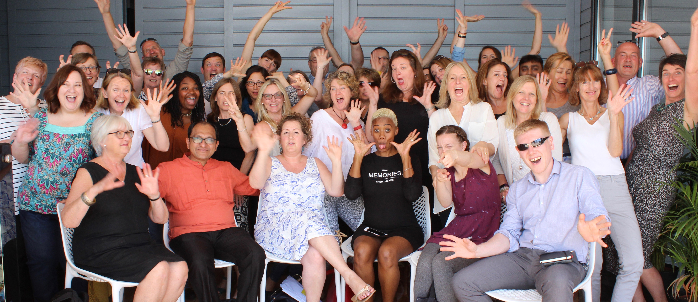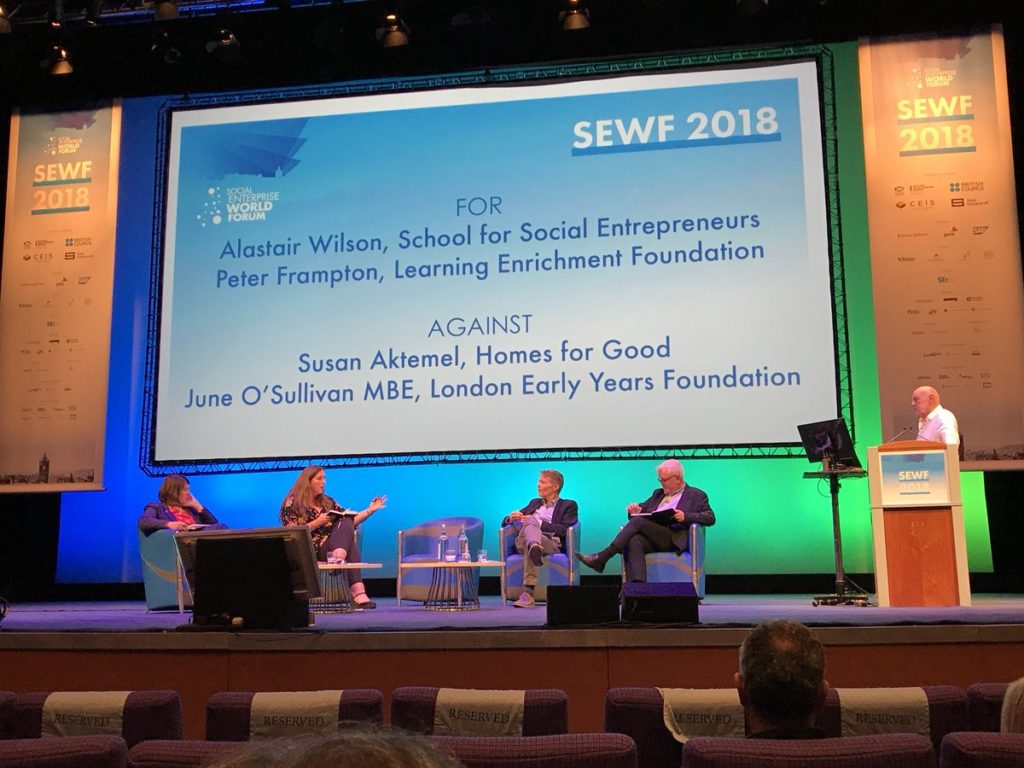Nine ways social enterprise needs to up its game
21 Sep 2018
Well this week is decidedly quieter than last. Where are the bagpipes being blasted? The CEOs swinging about in a Scottish ceilidh? The 1,400 social-enterprise stalwarts swapping stories and business cards and rounds of drinks?
Yup – the Social Enterprise World Forum in Edinburgh last week was a pretty rowdy affair. And the SSE crew were there in force, gathering insights and learning from others. Three days immersed in the global social-enterprise community got us thinking. Our sector is doing incredible things. So why don’t more people know about us?
Here are our reflections from the biggest get-together on the planet for the social-enterprise sector.
We need less back-patting and more real talk!
Sue Osborne, CEO of SSE Yorkshire & North East: “When you pull together a forum of 1,400 delegates all engaged in the sector, we are in danger of spending the time patting each other on the back. I thought Victor Adebowale’s keynote was a good exception: he set out a call to action and challenged us to do much more outside of our sector.”
We must be bolder and clarify our asks
Nicola Steuer, MD of SSE: “There were so many inspiring stories of social enterprise from around the world. But as a sector, we need to translate our ‘doing’ into broader messages, asks and actions, to truly change society. We need to show confidence in claiming the space about how to do business with purpose.
“I felt there was energy from the social entrepreneurs for this broader change, and that they recognise they are part of transitioning the economy to benefit people and planet. But I wanted more reference to it. We need to mobilise the power of this global community to set the agenda for the next 10 years.”
Social enterprise needs to ditch its own jargon
Bethan McGrath, communications coordinator, SSE: “When you’re trying to win support from people outside of the social enterprise sector, you have to speak their language. If you’re looking for corporate support, for example, you have to frame your language in terms of profit, CSR and employee engagement.
“Whether or not we believe everyone should be motivated by the intrinsic good of social purpose, we need to acknowledge that some people have competing priorities. If changing your methods of persuasion to suit your audience is what you need to make real social or environmental impact, then that’s ok. The most important thing is getting the job done.”

Some of the SSE global team – always supporting social enterprises with a smile!
We need to seize the opportunity – right now
Rob Pearce, director of development and external affairs, SSE: “As John Swinney SMP said, the time for business with a moral purpose has arrived. In the post- Brexit, post-austerity, post-Carillion world, there will be an appetite for a different way of doing business. This is now expected by people across the country. The challenge is: which businesses will step up to the plate, and how can social entrepreneurs make sure they are part of the solution?”
We need to broaden the tent, while being clear on our mission
Sue Osborne, CEO of SSE Yorkshire & North East: “Our sector is evolving, with big businesses taking on a social mission, through to social entrepreneurs who need to scale or duplicate their model to maintain their place in the social economy. Then of course there are the grass-roots social entrepreneurs changing lives, with limited aspiration to grow and yet achieving deep social impact.
“Social enterprise needs to support those with an appetite for change in the way they do business. But what is the social enterprise story that we are sharing as a collective?”
We need to join forces to better communicate our impact
Sophie Hobson, head of communications at SSE: “It’s great that we celebrate each other, but we need to break out beyond the social-enterprise bubble. Many people outside our sector still don’t understand what ‘social enterprise’ means. Yet here we are, tackling society’s greatest challenges, in pioneering and powerful ways. Why don’t more people know about our work?
“I think the problem is that many social enterprises are still so small. Half of the UK’s 70,000 social enterprises have fewer than 10 employees. Individually, we sometimes struggle to communicate our relevance. We should join forces to demonstrate how, collectively, social enterprises are tackling the world’s greatest challenges. We could – for example – combine impact data to tell a bigger story, or form more partnerships and alliances. We need to show the public and private sectors how powerful social enterprise is, so they ramp up support for our sector and start following our lead.”

Our CEO Alastair Wilson debating at SEWF 2018
Our sector is still small, so let’s support one another
Alastair Wilson, CEO of SSE: “We need to embrace enlightened self-interest. The social enterprise movement is still a relatively small world, so be generous and help others out. They’re sure to reciprocate, in a different guise, down track.”
Let’s look to the example Scotland and embrace our global purpose
Tracey Muirhead, CEO of SSE Scotland: “Having been at the first SEWF in 2008, also held in Edinburgh, Scotland rose to the challenge laid out at that first conference – to be a world-leading nation in social enterprise. John Swinney SMP proved in his heartfelt speech that social enterprise is the moral purpose of our society. Social enterprise means business and trade that respects the lives of other people, and makes that part of its moral purpose. There is a global purpose that we all share.”
Finally, let’s keep the big picture in mind: we are changing society
Nicola Steuer, MD of SSE: “Social entrepreneurs and social enterprises are to be found in all corners of the world, led by people working with passion and grit to improve things for others whilst still turning a profit. In so doing, they are demonstrating day by day that there is an alternative and better way of organising our economy and society.”
So what now? At SSE, we always want to do our best to support social entrepreneurs. What else does our sector need to do to up its game? Join the conversation @SchSocEnt
